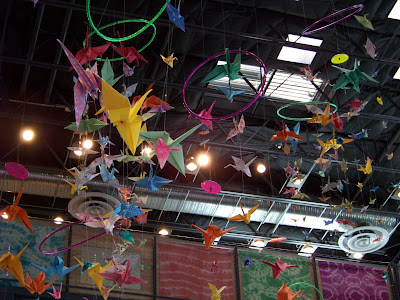My Grandpa died last night. It's odd calling him "Grandpa" here. In reality, he always had me call him by his first name. But I'm still trying to be a bit anonymous, so "Grandpa" it will be, in this space.
He was 87. He had been very ill with heart troubles so it was not unexpected. But I still feel the loss profoundly.
When I was a kid, I used to visit my grandparents every summer for a few weeks at a time. I posted about their awesome house in Pensacola, Florida,
here (scroll down to number 4) . I loved that house. But even more than the house, I loved the people in it.
My grandma was (still is) a wonderful cook and was generous with her time, taking me shopping, to the beach, out for ice cream, and for walks around the neighborhood, visiting neighbors and just enjoying the days.
My uncles were lots of fun, playing games (board games, hide & seek, ping-pong, bumper pool... you name it) with me, taking me bike riding, building sand-castles at the beach, and even playing the guitar for me.
And my Grandpa... I could sit and watch golf or reruns of old cartoons (Felix the Cat, anyone?) with him on the weekends. On weeknights, he loved to watch Johnny Carson, and I loved that he let me stay up late enough to watch it with him. I fell asleep to Johnny Carson many a night. Sometimes while we watched tv, he would play scrabble with me. He always won, but he always let me think I had at least given him a run for his money.
When I was very young, he sometimes liked to pretend to pull coins out of my ears. Or he'd say, "what's this?" while pointing at my shirt (and I would look, thinking I must have spilled something), and then "watch out for that!" while chucking me gently under the chin or on the nose with that same hand. I would laugh and laugh.... and he would smile that smile and do it again.
Once when I was about 12 he took me golfing and let me drive the golf cart. What a thrill! Too bad I didn't really know how to drive and I almost ran over some trees and other golfers and my driving privileges were revoked within fifteen minutes. But it was a wild, fun ride while it lasted!
My Grandpa sold insurance for a living. He was good at it because he really cared about his clients. He had lifelong clients who loved the service and thorough explanations and assistance with wealth management that he provided. He was the top seller in his region and/or in the United States many different years. My grandma assisted him sometimes at the office, and sometimes my grandparents would take me to the office with them for an hour or two. My impression was that my Grandpa's office was always clean, bright, well-run, efficient -- and that the people there seemed genuinely happy to see him walk through the door.
Because he worked a lot, I didn't see him as much as I saw my Grandma and uncles, but he would come home from work, invariably cheery, happy to be home, singing some old Bing Crosby song or Irish ditty, and smiling as though his family had just lit up his world. He loved to sing old songs for me, and he had a deep, resonant voice and such a happy twinkle in his eyes when he sang. Oh, how he loved to sing.
He would always talk to me when he came home from work as he kissed my grandma, saying, "Isn't she just the most beautiful woman you ever saw?" (Frankly, my 8 year old self thought they both looked a little old, 'though at the time they were only in their 40's, not so much older than I am now... ) I always agreed with him though, and indeed, my grandmother is a beautiful woman. I would never have thought to look for it if he hadn't pointed it out, but she has beautiful eyes, perfect cheeks, and clear, smooth, perfect skin... Looking at photos, it turns out she was amazingly beautiful when she was in her 20's - movie star beautiful, even. I haven't seen her in several years, but I imagine she is still beautiful, if a bit older, possibly grayer and more wrinkled...
After my grandparents moved to Atlanta, they loved to take me out to lunch and dinner, and particularly loved to introduce me to new foods. I think they were enjoying the new variety of restaurants in Atlanta, and were thrilled to have someone, even a teenager, with whom to share their joy and enthusiasm. I might never have tried escargots if my Grandpa hadn't talked me into it. Or Thai food. Or Indian food. Or frozen yogurt. Thanks to my Grandpa and Grandma, I learned to keep an open mind, to try new foods, and to enjoy new tastes.
They would also take me to hear concerts in the park, to art museums, and to the revolving restaurant at the top of the 70+ story Peachtree Plaza Hotel. All heady stuff for a 13 year old who had lived most of her life to date in a smallish college town.
In his free time, for many years, my grandpa liked to paint. He used oil paints and mixed the colors with such love and joy. He painted birds sometimes, and landscapes. I wish I had one of his paintings now.
He also loved to fix and clean things, to keep them in tip-top shape. Probably this was a result of him living through the depression and learning not to waste things, but it was charming nonetheless. I remember he loved to keep his shoes well-polished; and he loved to polish mine, too. I hated this as a kid, when scuffed up, dirty sneakers were "cool" and bright white ones made you look "geeky." Looking back on it, though, it was really sweet of him to take the time to keep my shoes nice for me.
He used to smoke a pipe when I was a kid. I loved the smell of the pipe tobacco, and the gentle sound of him packing and then lighting that pipe. As he got older, his doctor advised him to quit smoking, and my grandma demanded that he comply, so he gave up his beloved pipe. For years he struggled, though, smoking cigarettes off and on. The cigarettes didn't smell as nice and I don't think he enjoyed them as much, but he could buy a pack on the sly for not too much money, unlike the investment of a pipe and expensive tobacco which my grandma likely would have thrown out. He thought he would be able to sneak in the cigarettes. He'd go for a walk and light up while he was out, being careful to finish the cigarette several blocks before returning home so the smell would dissipate. It didn't work. My grandma could always tell when he had been smoking.
He struggled with alcohol, too. He liked to drink, and sometimes drank too much. My Grandma really hated dealing with his drinking. She used to tell him he was going to smoke and drink himself to death. His own father had died of a heart attack in his 50's. My Grandpa made it to age 87. Perhaps the stress relief provided by the alcohol and tobacco wasn't such a bad thing after all. Or perhaps he would have lived well into his 90's as his mother did, if he had quit drinking and smoking sooner. In any event, 87 isn't such a bad ride.
My Grandma and Grandpa had a somewhat difficult relationship at times. But I know they loved each other. She cared for him to the very end, and I am sure he was happy for her lovingly-prepared home-cooked meals, and her attention to his health, when he could no longer care for himself these past weeks and months.
And they had their good times, too. He loved to read and summarize articles from the newspaper for her while she cooked or drove. (She usually wouldn't let him drive; said his driving made her nervous). Sometimes they would debate issues, and they both seemed to enjoy sparring about politics and world events, or discussing whether "Dear Abby's" advice was any good that day.
They both enjoyed travel, too, when they were able. I remember many car trips to the mountains with them, in Georgia and Tennessee. We would stop at little roadside restaurants and dine on fried catfish and fried okra, or barbeque ribs and corn on the cob. Awesome food in beautiful places. My Grandfather dreamed of moving to a cabin in a small town in the mountains.
In more recent years, as my Grandpa's health deteriorated, he was unable to travel so much. But he discovered the internet, and he would send me (and my mom, and my uncles, and probably everyone else he cared about) several emails each week (sometimes several each day). He took the time to send individual emails to each person or to targeted groups on topics he thought might interest them -- rather than sending everything to everyone on a huge mailing list, as many folks seem to do these days. For me, the topics usually were law, politics, travel... and occasionally a joke or two, or some photos. He learned so much about computers, too, and would often send emails warning me of internet viruses or telling me about some great new program he had discovered. I loved this new connection with him. And it is oddly fitting to write a tribute to him on the internet. I think he would have liked that.
But over the past several months, his health declined substantially. It was difficult in many ways, knowing that he was weakening, suffering... but one of the most difficult things was knowing that he was unable to sit at his computer, unable to connect with the world in the way he loved. I miss his emails. I've kept a few, unopened. I'll open them in the coming weeks and months, and maybe it will feel like he is still here, sending his love. I hope so, anyway. Regardless, it will be fun to see what he found interesting and thought I would be interested in.
My Grandpa was a product of his times - certainly not perfect, and the family had its share of dysfunctional interaction. My Grandpa could be difficult and ornery, withdrawn and sullen, even a bit mean, if he had been drinking. But he was, overall, a good man. He worked hard to provide for his family. He loved his beautiful wife (my wonderful Grandma), even when they fought, and he loved every one of his kids and grandkids. He sometimes felt he did not do enough, perhaps did not know how to do enough, to make sure we knew we were loved. But I always felt his love. It was in his singing, his smile, the twinkle in his eye, the time he shared with me.
Grandpa, I miss you already. I hope you are in a place of peace and comfort. I hope you know that you were, and are, dearly loved.
.





























